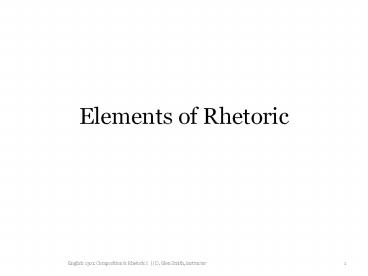Elements of Rhetoric - PowerPoint PPT Presentation
1 / 7
Title:
Elements of Rhetoric
Description:
Francis Bacon. In his collected essays, published in the 17th Century, Bacon discusses various philosophical and abstract concepts, such as Of Truth. – PowerPoint PPT presentation
Number of Views:83
Avg rating:3.0/5.0
Title: Elements of Rhetoric
1
Elements of Rhetoric
2
Deductive Inductive Arguments
- Both styles of argument are used to
- construct strong hypotheses and
- thesis statements.
- Both systems arrive at conclusions assumed
- to establish a defendable truth.
3
Definition of Deductive Arguments
- Deductiona style of argument which draws
conclusions from evidence assumed to be true the
results are expected to be valid and based on
truth. - Information provided must move from general
observations to specific notions. - Consider Sherlock Holmes, the classic example,
taking evidence from a scene to deduce the
criminal mastermind behind the crime highly
skilled in logic and reason.
4
David Foster Wallace
- In his published article in Gourmet (Aug. 2004)
Consider the Lobster, - In his introductory paragraphs, Wallace uses a
deductive rationale to explain the human
appreciation for crustaceans. - explaining types of festivals and peoples
obsessions for the seafood - notice in the example provided that he moves
from a general point to specific observations
5
Definition of Inductive Arguments
- Inductiona style of argument which moves from
specific facts (or basic observations of an
event) to generalities - Such arguments can be based on personal
experiences and then applied to broader
conclusions resolving issues within global
society or a smaller, individual community. - Moral or ethical themes work best with inductive
arguments.
6
Francis Bacon
- In his collected essays, published in the 17th
Century, Bacon discusses various philosophical
and abstract concepts, such as Of Truth. - Bacon uses an inductive rationale to explain and
define the concept of truth. - He explores various ethical issues of the
human thought process. - He moves from specific notions of truth to
generalities of human behavior.
7
Francis Bacon
- He follows general assumptions of his Renaissance
time period - Heavily influenced by Christian scriptures and
classical philosophy. - Bacon believes "truth" should be identified by
the "truths" established by dogma of
Christianity. - Bacon believes humans are actual descendants of a
historic Adam and Eve who became corrupted by
nature and desire. - He also assumes that humans have a moral
obligation to struggle against sin and human
frailties to pursue Truth and God.































![[PDF]❤READ⚡ The Elements of Legal Style 2nd Edition PowerPoint PPT Presentation](https://s3.amazonaws.com/images.powershow.com/10067916.th0.jpg?_=20240628102)